 Let’s face it. Coming up with good keywords can be challenging if you are new to blogging. Some of your articles might start to sound the same and you’re constantly lack of ideas on what to write next. Don’t worry.
Let’s face it. Coming up with good keywords can be challenging if you are new to blogging. Some of your articles might start to sound the same and you’re constantly lack of ideas on what to write next. Don’t worry.
This article is going to show you a few tricks on how to research long-tail keywords that are going to make blogging a whole lot easier.
Why Should You Use Long Tails?
For the benefit of those who don’t know what it is, the long tail isn’t just another fancy name. You see, the internet has a ton of keywords;
- Broad/General words i.e, ‘ball’, and ‘pet’.
- Intermediate phrases i.e, ‘throw the ball’ and ‘pet products’
- Descriptive phrases i.e, ‘how to throw a ball’ and ‘where to buy pet products’
And they are all represented by this simple curve graph.
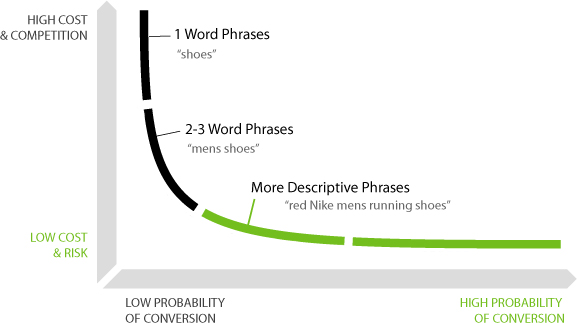
(Image courtesy of Neil Patel)
Broad words are commonly found at the beginning of the graph and descriptive phrases usually occupy the end part of the curve, which has a long-tail appearance, hence the name. What does all this mean? Why are long tails more important than the broad ones?
Although long tails don’t get as much traffic as other keywords, they offer way more advantages to you as an internet marketer/blogger.
- Longtails being descriptive, generally reflect more specific intentions from the users.
- People who want to compare and review products before purchase carry these kinds of ‘mental intentions’ when they research information online. So, it’s better to target 10 of these people instead of attracting 1000 readers who have no buying intention.
- The long tail can help you write better content in which you can use to interlink with other relevant articles in your blog.
- The more descriptive the keywords, the more page/post would be indexed on the search engines which will lead to higher rankings.
- And you WILL achieve top ranking on Google anyhow because there is minimal competition with long tails.
- And due to the low competition level, you can choose to run ad campaigns at a lower cost-per-click.
Now that you’ve understood the purpose of long-tail, let’s begin our research.
How to Research for Long Tail Keywords from Scratch
If you know how to use Google, half of the battle is already won. The powerful search engine has a few features that can help generate keywords for free.
(1) Alphabet Soup Technique
When I first started my online business, this is the method that I use (and still do today). In this technique, Google predicts what you are typing and generously roll out a few popular suggestions based on your original keywords.
Open your Chrome browser and you’ll find two columns to enter your keywords; the top bar where the URLs usually go to and the search bar which most of us are familiar with. I prefer using the top bar because it will offer more suggestions than the typical search.

Vs
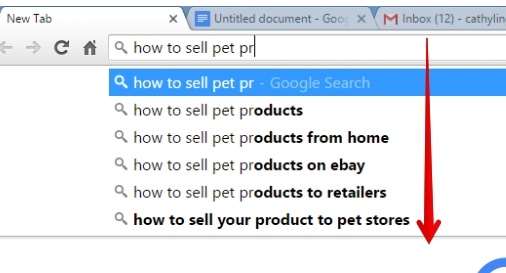 Look at that – 1 extra long-tail idea to add to your keyword bucket list 🙂
Look at that – 1 extra long-tail idea to add to your keyword bucket list 🙂
(2) Search Related Terms
This is another classic method that I like to use. Every time you search, remember to look all the way down to the search result page for the ‘Search Related Terms’ column. These are key phrases that are similar/relevant to your initial search and they are most of the time, long tail.

(3) Google Search Console (previously Google Webmaster Tools)
This technique is slightly more advanced, but it’s something you should check out when you’ve published about 50 articles or so. With this method, Google will show you other keywords that specific pages/posts are ranking for.
To find this out, go into your GWT dashboard, click on ‘Search Analytics’, check on ‘Page’, select a URL, and then check on ‘Queries’.
In the example below, I discovered that my page about “How to Find an Online Business Niche” is also ranked for 46 EXTRA keywords that I’ve never thought of. The caveat to this, however, is that some words could be rather general or doesn’t make a lot of sense.
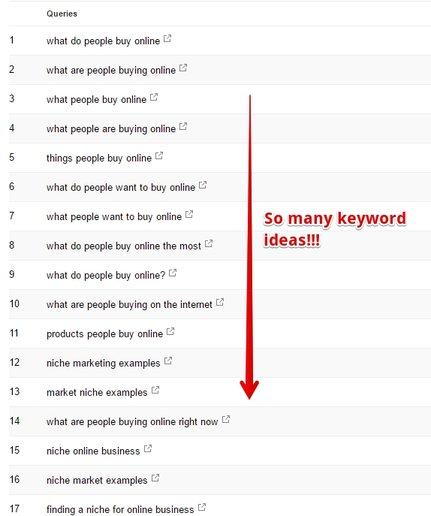
Therefore, you need to select carefully when going through the keyphrases. Repeat the same process for other URLs and you should be able to find some invaluable long tails.
(4) Commenting System
Moving away from Google, we are now going to use our observation skills to look for ideas in blog comments. What’s in there, anyway? Well, they are opinions, questions, and, most importantly, potential long tails generated by readers themselves.
The best place to start is to go through comments on your blog posts.
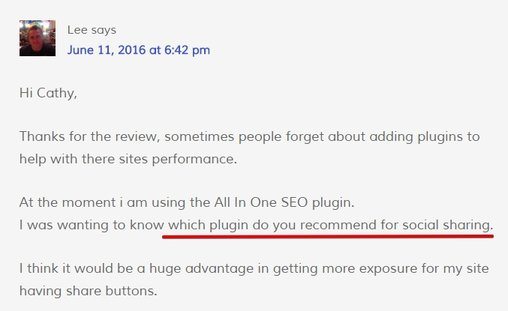
I think this would make a great article. Very soon, I will create a post based on that keyword idea, link to this comment and that should create more internal linking for my site.
Likewise, you can also check out comments on other blogs, YouTube videos as well as Q&A forums related to your niche. Put on your radar and you will be able to pick up a couple of long tails in the process.
(5) Emails / Newsletters
If you subscribe to emails from bloggers or authority sites, you would receive their newsletters regularly. I know, some people call them trash, but I see them as a wonderful resource for finding long-tail keywords.
I usually group them in specific folders in my Gmail account so that I can have a quick scan of the list. Here’s an example of the emails that I received from a blogger that I subscribe to.

Ok, ignore the promotional tagline. Instead, focus on the eye-grabbing titles that I’ve underlined. They make good long tails, don’t you think?
(6) Keyword Research Tool
If you are using a keyword tool that doesn’t produce long-tail effectively, you are going to waste a lot of your time writing content that wouldn’t rank. My favorite keyword tool is Jaaxy and it churns out long tails instantaneously and effortlessly, in my opinion. Let me show you what I mean.
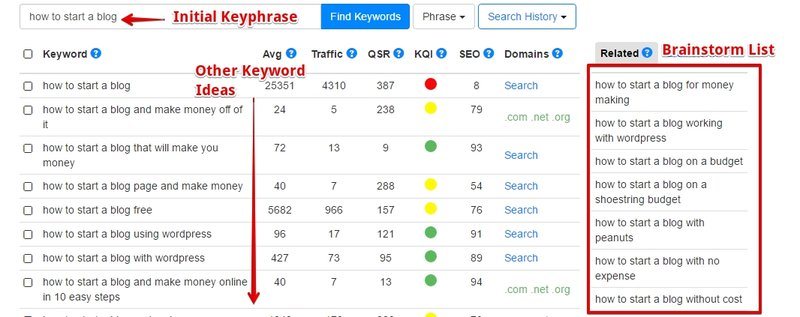
All I need to do is enter a key phrase, run the search and it would show me a list of relevant long tails. If you look to the column on the right-hand side, there’s a brainstorming section that reveals even MORE keywords related to your search.
Using the easy to interpret metrics, you can immediately narrow down to the keywords that make sense and have low competition (low QSR value). It is that easy.
The other feature that I am starting to explore a bit more is the ‘Search Analysis’. Just enter a key phrase and it will show you the top 10 sites ranking for that particular term. Copy any of the competitor’s domain names (preferably blogging sites, not eCommerce), paste it into the keyword search and change the tab from ‘phrase’ to ‘URL’.

The results that appear initially are usually broad and intermediate keyphrases that the site is currently ranked for. To look for long tails, just click on an interesting keyphrase, and Jaaxy will do the ‘digging’ for you. You might need to repeat this 2 to 3 times, but ultimately, you’ll find a list of awesome long tails that have never been tapped before in your niche.
Pretty cool, right?
Endless Long Tail Potential
Researching for long-tail keywords can be very rewarding, but it could also become quite addictive. So don’t get carried away and always remember that you still need to produce good content that matters to your readers, optimize the post/page for SEO, get comment engagement and create more internal links.
If you can implement these methods over and again, I can assure you that your website will grow and so will your traffic and sales.
# Tips; I would recommend spending an hour/month to search for 10-20 long tails and focus the rest of the weeks on writing articles. I find that this method produces the best results in terms of creating great content and managing my daily blogging tasks.
So, are you still trying to figure out how to research long-tail keywords for your niche? Give Jaaxy Keyword Tool a try OR visit my recommended training platform at Wealthy Affiliate to learn more.
Do you have any thoughts or questions about this topic? Feel free to leave them below and I’ll get back to you the soonest.

I have never heard of long tail keywords until I arrived at this blog, and never knew it can be such an important elements of a website.
I’m researching my keywords using Wealthy Affiliate’s Keyword Tool, but never pay any attention to words’ length. Will definitely look back at my post again to check if any useful long tail keywords can be inserted. Thanks!
Hey there Gary, just some heads up. If you have published articles using short keywords, just let them be. Don’t go in and change things, especially the permalinks. Otherwise you’ll need to create 301 redirects which can be very troublesome.
Just move forward and create new articles targeting long tail keywords. You should be fine from there.
Hi Cathy,
Thank you for such a great post! I read all the post and I have learn so much with it. Still a newbie in the internet marketing, so all of this is great info for me. Didn’t know you could find great long tail keywords in Google Webmaster Tools. I’m going to use this for sure.
Hey Alex, you can find long tail keywords almost everywhere. As long as you are super observant, you can discover them online and offline.
Ready good information on long tail keyword research. This is an area where many people stumble and struggle to get things right. Your article provides a good insight in ways to overcome the problems that most beginners would face. It takes the fear out of most of us as you made this complicated topic so much easier to digest.
Hi Cathy. Your blog never ceases to amaze me. You’ve listed down some of the most useful tips on finding long tail keywords that I never know about! From bar of chrome, end of first result page, webmaster tool, and comments section are all ingenious methods to find that sweet looking trail keyword. Many thanks for these methods.
P/s: I’m also starting out with your tip on finding keywords for one whole month one time and just publish posts based on that keywords.
Hey Isaac, glad you found this information helpful 🙂
Awesome and informative post!
Long tail keywords are the way to go. It can be very hard to find decent ones though, so this is a very helpful post. A lot the keywords in my niche seem to be high in competition, but using these techniques, I might be able to find some good ones to target.
Keep the great articles coming!
Hey Hannah, glad to know that it helps! 🙂
For someone like me who just started with Wealthy Affiliate, your blog definitely help me out. I like to read about all the different ways that marketing works, best ways to use keywords and etc. I think the toughest part for me is creating content after finding my niche and keyword research.
Hey Lorenz, I think we all struggled with that as beginners. The best piece of advice that I can offer you is don’t take your content too seriously. Don’t think about that it is not perfect, don’t worry about ranking, don’t worry about the number of words.
Find a good keyword and elaborate on that idea in conversation style. Publish it and move on to the next. If you think too long, you’ll succumb to analysis paralysis and that’s not healthy for your online business moving forward.
I can see how long tail keywords could really benefit you even though there isn’t as much traffic. Because if you were to aim at a higher competition keyword, you’d be less likely to rank higher then your competition and you’d be stuck way at the bottom of the pages.
I use the Alphabet Soup Technique all the time for finding better keywords, and sometimes I come across new ones I hadn’t thought of! Is it possible to rank under two different long tailed keywords in an article? Or does Google only search for one?
Oh yes, you can certainly rank for multiple keywords in a given article, especially if it’s long and descriptive. I’ve seen it happened for some of mine. From my experience, the more article you published, the more the content get indexed and hence, more pages will be ranked for various keywords.
Very helpful post! I personally am a member of Wealthy Affiliate and it is great. I also have my own website and good keywords are really important. They can highly influence the amount of traffic you get.
What technique for finding good keywords is your favorite to use? I personally use Alphabet Soup and Jaaxy.
I use mainly Alphabet Soup Technique and Jaaxy Keyword Tool too, but I also like to draw inspiration from comments on blogs/forums because those are real life situations where people are looking for solutions to their niche problems. Hope this helps.
Hello Cathy,
Thanks so much for your very well written and well explained post on how to look for and find long tail keywords.
I have been online writing posts for a while but did not up to now, understand very well how long tail keywords work.
You have explained things so well and in an easy to understand way.Not only that, you have gone one further and shown how to look for long tail keywords in replies – something that l never thought of before.
Although l used Jaaxy keyword tool before, l don’t remember searching for any long tails.
Thanks Cathy, l have really enjoyed reading your post and have book marked your site for later.
If you are a Jaaxy user, then you already have one of the best keyword tool to search for long tails right at your fingertips. The last method that I showed about digging keywords from the competitor URL can offer a lot of new ideas so I hope you would use this technique for your content creation sometimes.
Your suggestion are obviously good for content building. You have identified a really useful piece of information there. I certainly understand much better what to look for and this concept will save me lots of time and wasted effort. Thanks for putting that together. I like the way you have laid out the information. There are so many details to learn in this business that a well written guide like yours is worth it’s weight in gold.
Glad to know that you found something valuable from this article. Long tail keywords is such an important topic yet so many beginners get so confused about it. I hope this article can help our fellow bloggers/internet marketers write better content.
Thank you for sharing. Researching long tail keywords is definitely the right approach considering how it targets our audience more correctly. Short keywords are usually too general and the audience aren’t really sure of what they are looking for yet.
The alphabet soup is also a great technique used to find potential keywords. However, can you do it backwards? Like for example at the beginning instead of the end?
Absolutely. Thanks for pointing that out. Here’s an example of the Alphabet Soup Technique that starts from the beginning of a keyphrase.
I use this method sometimes whenever I ran out of ideas to use for my blog.
Wow, Cathy you really are a fountain of knowledge – I started reading this first article and then got distracted by all the other great articles on your website. It is great to know there are websites like this out there that really are so helpful and informative. Usually, people will only give you snippets of info but you have gone into so much detail and been really helpful. I will definitely be using this website as my guide from now on. Will also try out WA etc. How long have you been a full time blogger for now? Thanks
The main reason you are reading snippet-like articles is because the bloggers haven’t explored much on the keyword breakdowns. They are either using broad terms as their topic or are still in their early phase of blogging where they haven’t really polish their writing skills yet.
So you see, going for longer keywords isn’t only good for the readers, but for the bloggers as well. Here are more training on long tail keywords if you wish to learn about them.